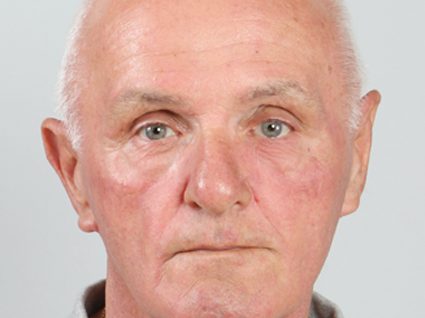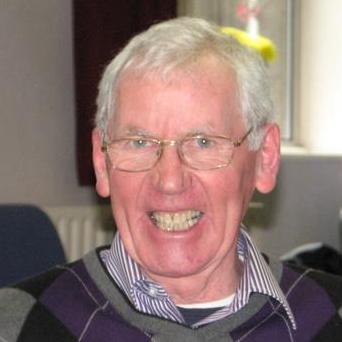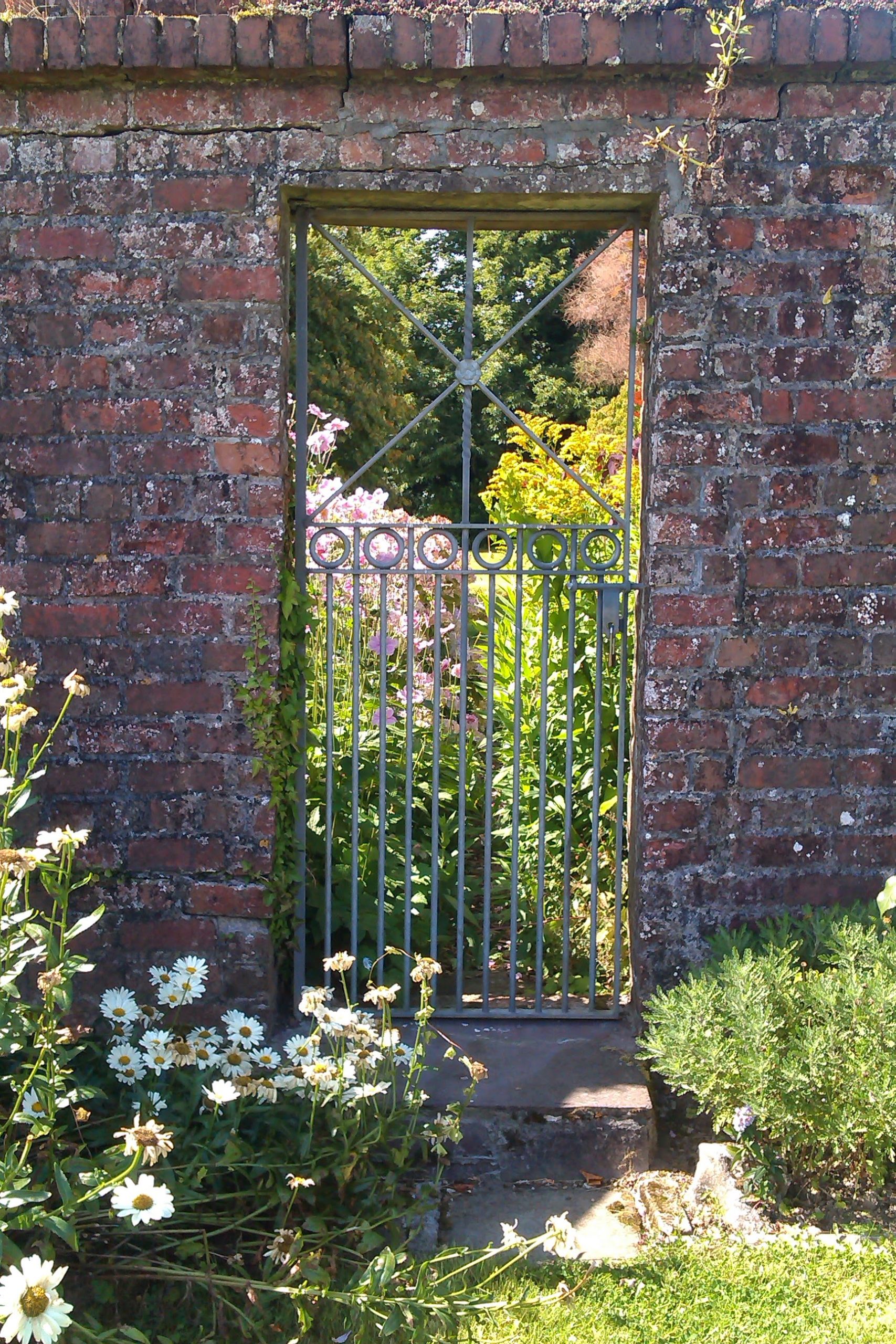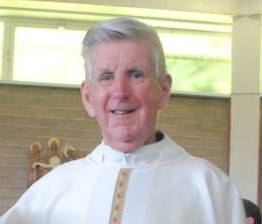Return to Esso – Elaine Hogan
I returned to Tanzania in January to visit Esso – a parish run by the Pallottine Fathers – where I had lived before for over a year, and also to visit Malambo in the Ngorongoro conservation area where Fr. Mike O’Sullivan, a Pallottine Father from Co. Kerry, is now ministering to the Maasai tribe.
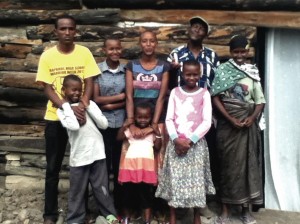 Esso is as vibrant as ever. I visited all the various “Pallotti projects” which have been set up over the past eight years and I am delighted to say that they are all thriving. The computer classroom was filled with new students, and being taught by Tanzanian teachers. The primary school now occupies six rooms in the Resource Centre. The Faraja (Joy) centre for children and adults with disabilities was being looked after by a young Tanzanian occupational therapist while Clare, the Irish lady who set it up, was home on holiday. The sports hall was packed with teenagers every afternoon and the buzz of activity around “Pallotti” is still there. The local people are now taking leadership of the projects themselves.
Esso is as vibrant as ever. I visited all the various “Pallotti projects” which have been set up over the past eight years and I am delighted to say that they are all thriving. The computer classroom was filled with new students, and being taught by Tanzanian teachers. The primary school now occupies six rooms in the Resource Centre. The Faraja (Joy) centre for children and adults with disabilities was being looked after by a young Tanzanian occupational therapist while Clare, the Irish lady who set it up, was home on holiday. The sports hall was packed with teenagers every afternoon and the buzz of activity around “Pallotti” is still there. The local people are now taking leadership of the projects themselves.
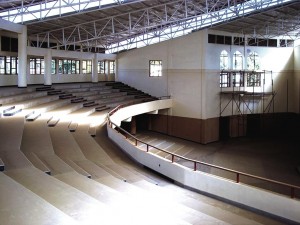 The new Church, built to hold 1,400 people, will be handed over to the parish for the Easter services… a credit to the locals who provided a lot of the cost through their weekly contributions. What a success story for all involved!
The new Church, built to hold 1,400 people, will be handed over to the parish for the Easter services… a credit to the locals who provided a lot of the cost through their weekly contributions. What a success story for all involved!
Fr. Noel O’Connor asked me to visit a family on his behalf to find out how they are getting on. There are seven children in the family and Fr. Noel is trying to support them by raising funds to send them to school. They lived in the changing rooms on a football field in Esso for a long time, but now they have a small plot of land in another parish and live in a wooden house – with absolutely no flooring, just mud – and the interior dividing walls are made from sheets of cardboard. They are gradually buying materials to build a brick house. The children are all doing very well in school. Their father is now working on a building site and the eldest son has found work installing solar panels. They are very happy and healthy, and each one proudly recorded a video greeting in English for me to show to Fr. Noel when I got home. I visited Fr. Mike in Malambo, an outstation of Loliondo parish. There are several outstations all around the hills and mountains of Malambo, which Fr. Mike tries to visit as often as possible. The landscape is outstanding and the peace and quiet was astounding! Fr. Mike says Malambo is “Africa’s best kept secret”.
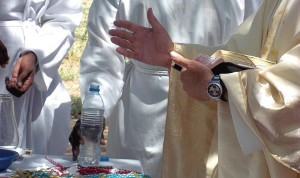 One Sunday, Fr. Mike said Mass in Piaya. In this rural area the community only sees a priest two or three times a year. There are no tarmac roads and it is a three-hour drive away. In Piaya we visited the home of the parish chairman who had died tragically two weeks previously (Christmas week) leaving nine children behind, the youngest being only two years old.
One Sunday, Fr. Mike said Mass in Piaya. In this rural area the community only sees a priest two or three times a year. There are no tarmac roads and it is a three-hour drive away. In Piaya we visited the home of the parish chairman who had died tragically two weeks previously (Christmas week) leaving nine children behind, the youngest being only two years old.
When we arrived, his widow welcomed us and had already prepared refreshments. She was a truly beautiful lady and an inspiration. Her attitude was to get on with things for the sake of her children. There were a lot of other children around that day and also a catechist who had been in Piaya to prepare them for the sacraments. Fr. Mike heard confessions before Mass; and during Mass there were baptisms, first communions and confirmations.
After the long Mass, we were invited back to the house where a feast had been prepared for everyone in celebration of all the sacraments received that day. On the journey home we were joined by an old Maasai man and two young boys. There are only a handful of cars in the area, so if there is the opportunity of a lift somewhere, the people will take it. The boys were on their way to a government-run boarding school for hundreds of Maasai children, and without a lift they would have to walk for two days through wide open land with lots of wild animals. 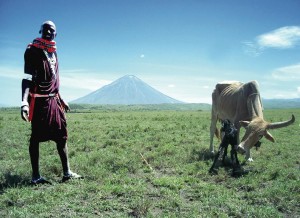
The school year begins in January, so driving around the area at that time we saw children either running after a car asking for a lift, or running in the other direction if they thought it was a government car sent to take them to school! But some parents don’t send their children to school as they are needed at home to look after the cattle.
On that Sunday, our youngest passenger, who was about eight years old, had car sickness… and there was nothing we could do only keep on driving; we were in the middle of nowhere. Fr. Mike had arranged a meeting at another outstation on the way home as he was planning a seminar and wanted to personally invite the young people. While the meeting took place under a tree with the men of the village, the women took the sick little boy and washed him and his clothes, and by the time we left a half an hour later, the car was clean, the child was clean, his clothes were dry and the women had wrapped a plastic sick bag around his ears before allowing him back into the car again, the poor little guy!
We returned to the same village later in the week for their first catechism class. It had rained the night before, so the people who had requested the classes were out in the fields looking after their crops. We waited around for them for over an hour (no hurry in Africa). In their first class they learned how to make the sign of the cross. Then Fr. Mike spoke to the surprisingly large gathering of men, women and children.
He held up a bottle of water and explained how it would be blessed and then he would sprinkle it over them and they would be blessed. The sign of the cross and holy water: two things I take for granted every day, these people were only learning now, in the year 2014! Fr. Mike told them that he would be back again soon to bless their houses (mud huts) and their animals, and they were very happy. An elderly woman jokingly asked if she could attend the seminar for the youth: she must have been eighty years old… and she was only just learning how to make the sign of the cross! One day in Malambo we visited a woman Fr. Mike had met a few times before. She had been working in the field one day when a dust storm came and lifted her into the air with such force that when she landed she was paralysed. Now she was sitting outside on a bucket in the shade with her three toddlers playing beside her. Fr. Mike said it was the first time he had seen her sitting; she was usually in so much pain she had to lie flat on the ground. There was also a very beautiful, quiet and shy teenage girl. They all lived in a tiny mud hut, but a strong wind had blown the roof off it. Fr. Mike told her that he was making arrangements to build a small two-bedroomed house for her and her family – it would be made from brick and would have windows and doors. (At a cost of about one thousand Euro). The woman was stunned by this news: she was speechless. As we walked away Fr. Mike said “If anyone deserves a break in life, it’s that woman”.
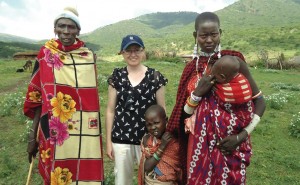 I must mention the child who was born while I was there – whose father I had met a few days before he had died of cancer a week earlier and whose mother had died as she gave birth to him. That little boy will be raised by his relations now and I have no doubt he will be happy, but I can’t help but feel sad for him.
I must mention the child who was born while I was there – whose father I had met a few days before he had died of cancer a week earlier and whose mother had died as she gave birth to him. That little boy will be raised by his relations now and I have no doubt he will be happy, but I can’t help but feel sad for him.
I could write a hundred stories about how difficult life is for the people, but I would also have to say how unbelievably happy they are despite all the hardships and poverty they face every day. And I have to take this opportunity to say a sincere “Thank You” to all who have donated towards the work of the Pallottines in Tanzania. Your donations really do go a very long way.

